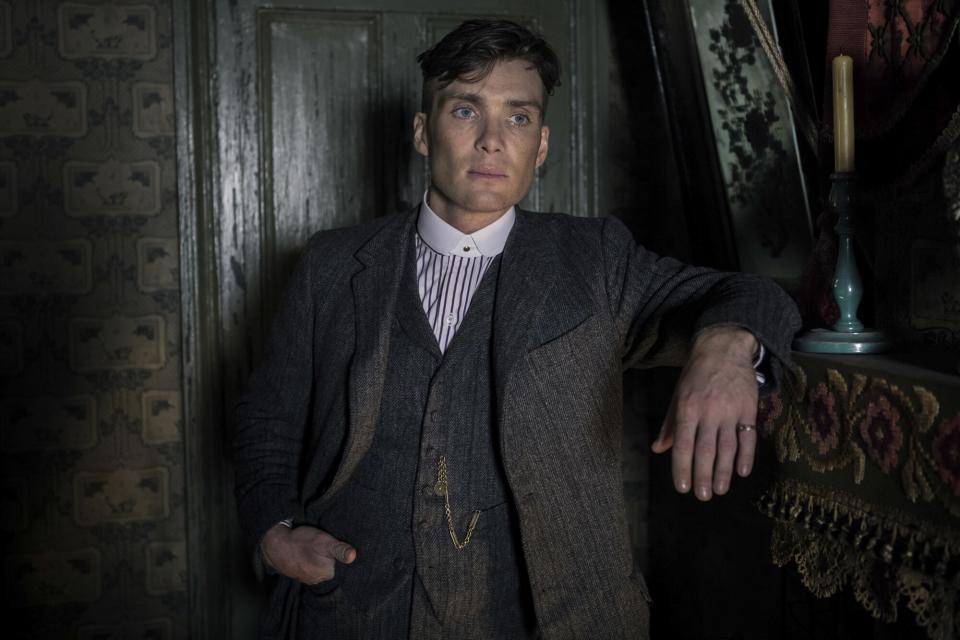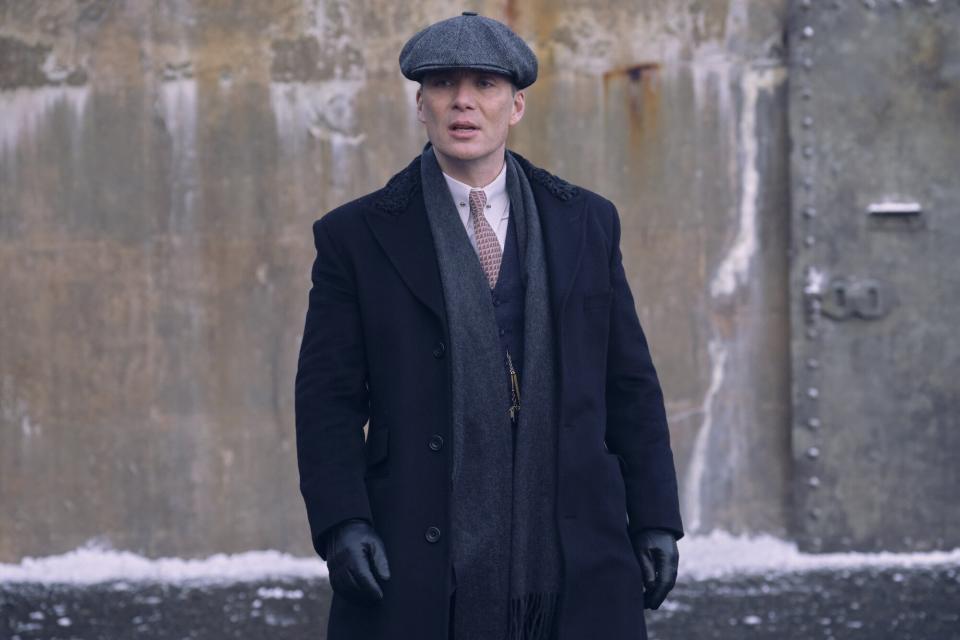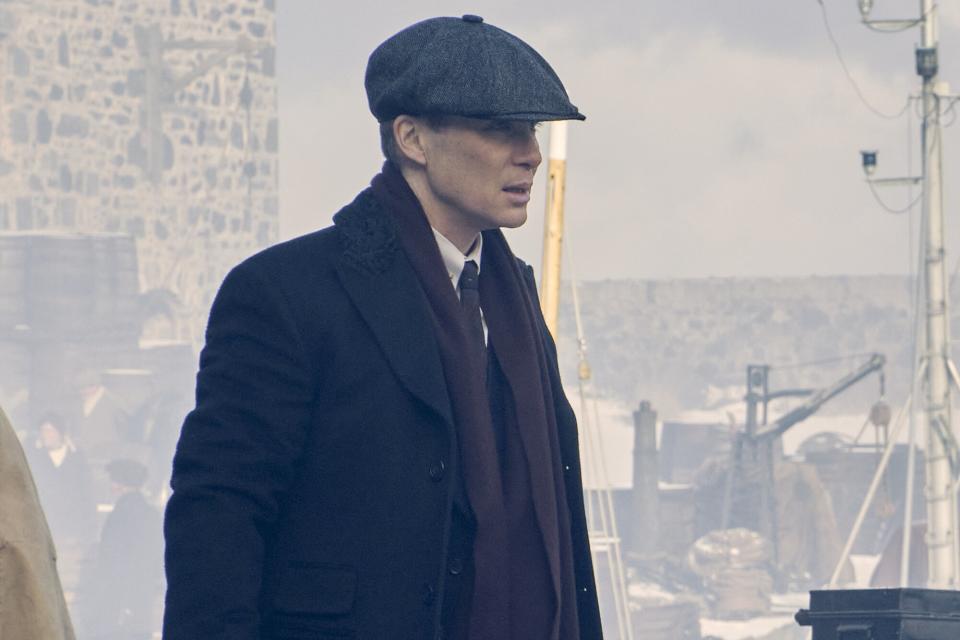Peaky Blinders star Cillian Murphy on a decade of playing Thomas Shelby and why he had to fight for the role
- Oops!Something went wrong.Please try again later.
- Oops!Something went wrong.Please try again later.
Warning: This post contains spoilers from Peaky Blinders season 6.
When Thomas Shelby (Cillian Murphy) walks into a room, people pay attention. Maybe it's the outfit — an impeccably tailored three-piece wool suit, his signature newsboy cap and a peacoat that's somehow both menacing and stylish — or maybe it's his confidence, the way he can say so much with one glance of his baby blue eyes. Or perhaps it's the razor blade sewn into his cap.
Peaky Blinders premiered on BBC Two in 2013, delivering a one-of-a-kind, hyper-stylized gangster saga about Birmingham's Shelby family, better known as the Peaky Blinders, their name coming from those razor blades sewn into their hats. Their leader, Thomas, has ambitions for his family that stretch way beyond the horse race gambling ring that they run at the start of the series. Tommy is as much an intellect as he is a gangster. Much like the cap on his head, he hides his lethality just under the brim.
It was a role Murphy knew he wanted, and one he was willing to fight for. "There was slight hesitation because I'd never really played that physically imposing sort of hyper-masculine-type character," Murphy tells EW. "In fact, I'd probably played the opposite up to that point. But I knew that it was such amazing material and I knew that it was a gift of a role and I just needed to convince them that I could do it and I could work to become that physically imposing character."
Peaky creator Steven Knight recalls meeting with Murphy for the first time, after which he got a text from Murphy that read, "Remember, I'm an actor." As Knight puts it, he was saying, "That person you just met isn't the person who's going to show up on day one."
And it wasn't. On day one, Murphy showed up as the guy who'd stop at nothing to win, the guy whose trauma both paralyzed and empowered him, and most importantly, the guy who could make a slow-mo walk down a dark alley way utterly compelling. Now, a decade later, Murphy has helped make Thomas Shelby one of television's most interesting characters.

Everett Collection Cillian Murphy on 'Peaky Blinders'
As Peaky premieres its sixth and final season — with a movie still to come — EW spoke with Cillian Murphy about his time in three-piece suits.
ENTERTAINMENT WEEKLY: This show has had such a fascinating journey to success, because it feels as though its spread has almost entirely been due to word of mouth. What has your experience been with the popularity of Peaky Blinders?
CILLIAN MURPHY: I like that you said that it was 100 percent by word of mouth, because that is true. We were a little show on BBC Two and the BBC does not spend much money on advertising. For me, it was when we went to the premiere of series 3 in Birmingham and there were thousands of people there and they were dressed as Peaky Blinders. Obviously, it's about that city and it's from there so it's special, but at the same time, it was people all over the world having Peaky Blinder parties and Peaky Blinder weddings and there [were] all these pop-up shops and bars. Between series 2 and 3 for me was really when it started to become this phenomenon.
Steven still recalls your first meeting and you texting him after saying, "Remember, I'm an actor." What do you remember about that first meeting?
That text may be apocryphal, but I'll take it because it's a cool story and I hope I did say that. There was slight hesitation because I'd never really played that physically imposing sort of hyper-masculine type character. In fact, I'd probably played the opposite up to that point. But I knew that it was such amazing material and I knew that it was a gift of a role and I just needed to convince them that I could do it and I could work to become that physically imposing character. It's just a good story, but there is a kernel of truth in there as well. But that's the thing about acting, you shouldn't be limited. In this business it can be slightly reductive if you do one thing well once, the industry wants you to do that again and again and again. And it can be slightly myopic that way, but I've always tried to do the unexpected or play roles that are challenging so that you never get trapped in a career.
What is it like to sit with a character for so long?
It's fascinating. We started shooting this in 2012 so when it comes out, that will be a decade, so it's a big chapter of my life, a big chunk of my life. In between I did lots of other things but I've never had that experience of growing older with a character or being able to inhabit it to a point where the character starts thinking for you in the performance. That happens toward, certainly series 4, 5, and 6, it was definitely the character was in control of the vehicle, if you know what I mean. That's amazing, I've never had that experience before.
Did you have any traditions or things you did to get back into character every season?
It never became easier, like I couldn't do it now. It wasn't just putting on a cap. It's always a process getting back in. There was always a long period of myself and Steve and the director sitting around together and going over the scripts and then me conditioning to get into shape again. And the accent's not an easy accent, so I'd always have to refresh the accent every year. It's not one of those ones you can get out of the car and you're ready. It's a lot of work.

MATT SQUIRE/Netflix Cillian Murphy on 'Peaky Blinders'
Did you have much of a say in the look of the character or was that already in the script?
Steve had very consciously written the cap because that's where their name comes from. That was very much a part of it. Then we've had brilliant costume designers over the course of the show and they made that now iconic silhouette with the cap and the suit or the coat. It wasn't all totally in line with how exactly the clothes were worn. We would tailor them to suit each actor but they're hugely flattering. It's very flattering to wear a three-piece suit for a man and that cap. When you put it on you kind of feel like the character. And then all of a sudden everybody started wearing them, that was the crazy thing. Everybody started wearing the suits and the caps.
One of my favorite things about Peaky is how it's never summer. They're always wearing peacoats.
[Laughs] It's true. I think we shot series 4 in the summer, we normally shoot during the winter but we shot series 4 during the summer for some scheduling reasons and we were baking. All of us were just baking. We just skip that season in Peaky Blinders land. It was difficult shooting because it's pure wool and layers of it. We like it nice and gloomy. [Laughs]
How much of Tommy's arc did you know going into each season? Would you know where it was ending?
Yeah. The thing that we have, which I think is rare on a TV show, is that we have six completed scripts before we start. We always know where we're headed. The scripts are exquisite always, so I never have any input in the script, I have input in post-production and music and stuff like that but Steve is such a brilliant, dynamic writer that they're so unpredictable in a great way. You never know what's going to happen. That's what's so brilliant about his writing, it's never predictable.
How do you think the series has benefited from having Steve write every episode?
It's been one of the most important aspects of the show. He's written 36 hours of television, it's phenomenal. He said to me once that it came out of him like spring water because it is so much a part of Birmingham, the stories came from his parents, and so it's something he's very passionate about and loves. But I think that's been one of the real special qualities of the show is having that one distinct voice the whole way through.
What drives Thomas Shelby?
It's sort of changed over the years as he's gotten older, but I think initially it was, having survived the first World War, to actually come that close to death and see your friends blown to pieces before you and all this trauma that he lived with, I think he was unafraid of death. That is an amazing engine to have as a protagonist because everything is like, "Why not? I could've been dead any minute there for four years, now I'm just going to take everything I can." So it was that combined with this ambition. He's burdened with this intellect. It's not a happy thing to be outrageously bright and he is, so in order to keep that mind active he has to keep working.
And as the series progresses, the threats from all sides that began to happen are another engine for him to protect the family, to protect the gang, to protect the f---ing empire. Then the thing to become a politician because they're all f---ers up there, they're all corrupt, so I can do that. It's a combination of things but the one thing that holds is this relentlessness.
There's a line in season 6: "No more Polly, no more whiskey, no more Tommy." What was it like to play this version of Tommy?
It was very interesting. That was something I couldn't have predicted. He was sort of defined by his whiskey, how much whiskey he drank. But the drink was maybe becoming an impediment. Polly [Helen McCrory] is very much part of the series, her influence is still in there and particularly for Tommy because I think it's been very, very hard in this series for Tommy to operate without Polly, because she was his closest confidant and the person he trusted most. It's very much in the story, that absence.

MATT SQUIRE/Netflix Cillian Murphy on 'Peaky Blinders'
Have there been moments when you weren't happy with Tommy?
Sometimes I find the violence and the disconnection to the violence difficult. There were times where I would talk to Steve and go, "Does he really have to do that?" I struggle with the violence sometimes, but there's always consequences to the violence in Peaky, it isn't like superhero violence. If someone gets injured, they stay injured. There are consequences. But I struggle with that part of it. But he is a contradictory, complex, difficult character to play. You've got to put aside your own moral compass and go with it.
So much of this show is close-up shots of your face. What's it like to film those?
I think it became part of the language of the show from the beginning. In the very first series there was a lot of close-up work that we wanted to do. We wanted to try and get inside Tommy's head if possible, to be really really close to his experience, and then that became the language of the show. Close-up acting is some of the best because it's when you see a character think. I'm a big believer in stillness in film acting and if you can really just make the words, make the thoughts manifest in your face, that's what you want.
The series has wrapped. Did you do anything to shed this character or say goodbye?
I mean, I grew my hair out, but I do that every year. I don't really have any perspective on it. I think once it airs and is out and the fans have seen it, then perhaps I'll have some perspective on it. But I do hope we'll make a film and Steve is very keen to make a film. There is more life in the old dog yet, I think.
This interview has been edited and condensed for length and clarity.
Sign up for Entertainment Weekly's free daily newsletter to get breaking TV news, exclusive first looks, recaps, reviews, interviews with your favorite stars, and more.
Peaky Blinders season 6 is out now.
Related content:

